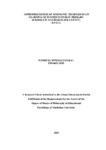| dc.description.abstract | Mnemonic techniques are memory strategies that help learners recall large pieces of information. They link new information to prior knowledge through the use of visual and acoustic cues. They have been proven effective with students at a wide range of abilities and grade levels. The purpose of this study was to investigate the appropriateness of Mnemonic techniques on learning outcomes in primary schools in Machakos sub-county, Kenya. To achieve this, the study sought to find out which Mnemonic techniques were appropriate for Free Recall and serial learning tasks by comparing pegword, keyword and music Mnemonic techniques and control group. Thorndike Connectionism theory and Tulving Theory of Long-Term Memory were used to ground the study. Factorial-experimental research design was used to test the appropriateness of three Mnemonic techniques on learning outcomes. Schools were first stratified into three educational zones of Machakos; Muvuti, Mutituni and Mumbuni zones. Purposeful sampling technique was used to select four schools with similar mean grades in KCPE exams from the three zones. Simple random sampling was used to assign streams experimental and control groups. A sample of 317 pupils were selected from class 7 pupils to participate in the study. The instruments of study were tests, (to measure learning outcomes); observation schedules (to monitor the treatment process) and questionnaires; (to measure level of satisfaction among learners during treatment process). Research instruments were piloted to establish their validity and reliability. The reliability of the research instruments was determined through the test-retest method. The reliability index for the instruments was; RAT Tests 0.92, CAT Tests 0.93, questionnaires 0.87 and observation schedules 0.89. The results were analyzed descriptively and inferentially. Two-way and one-way ANOVA were used to analyze the data. Post-hoc Pairwise comparison was also performed. The findings of the study showed that there are no significant differences (F (3,318) = 2.26, P> 0.05) in Free Recall learning outcomes between learners who were taught using the three Mnemonic techniques. Hence, none of the three Mnemonic techniques was found to be more appropriate for Free Recall learning tasks. Data on serial learning tasks revealed significant differences (F (3,317) = 4.70, P< 0.05) between learners using different Mnemonic techniques and serial learning outcomes. Post-hoc analysis showed that Music was the most appropriate Mnemonic technique for serial learning tasks, Pegword, keyword and control group were second, third and fourth respectively. No significant differences (F (3,147) = 0.052, P< 0.05) were found in mathematics learning outcomes between learners using the three Mnemonic techniques. Hence, none of the three Mnemonic techniques was found to be more appropriate for mathematics. In Social Studies, significant differences (F (3,146) = 4.25, P< 0.05) were found between learners using the three Mnemonic techniques. Post-hoc analysis showed Music Mnemonic was most appropriate for Social Studies, pegword, keyword and control group were second, third and fourth respectively. The conclusion of the study was that mnemonic techniques enhance learning outcomes at varying degrees; music was the most appropriate among the mnemonics used in this study. The study recommended that, KICD should in-cooperate Mnemonic techniques in teacher training colleges. | en_US |

